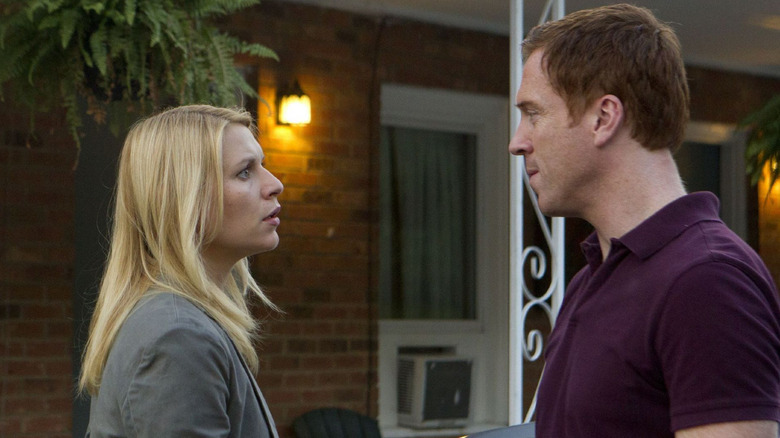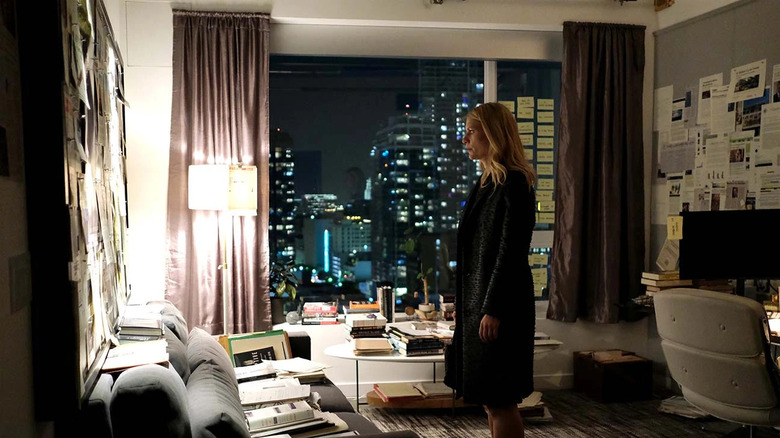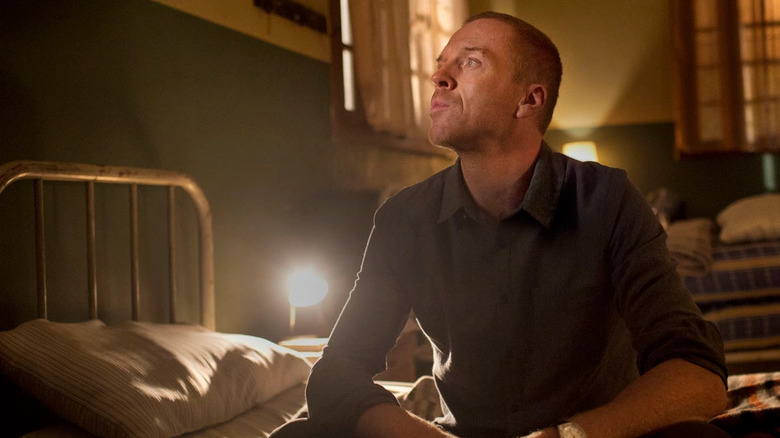Homeland Found Its Second Wind Thanks To A Series Of Real-Life 'Spy Camps'
For three eventful seasons, "Homeland" revolved around CIA Officer Carrie Mathison (Claire Danes) and her pursuit of disgraced marine Nicholas Brody (Damian Lewis), both professionally and romantically. The back-and-forth game between them was the source of much of the drama and tension on the show. Moreover, Brody's storyline offered a layered depiction of the United States' questionable actions overseas. That is, until "Homeland" decided to kill off the fan-favorite character in season 3. When things started getting stale, it was time to switch up the status quo. From that point on, the Showtime series reinvented itself, behind and in front of the screen.
"Homeland" covered a wide variety of issues on an international level, but homegrown threats were often the focus. The unceremonious end of the complicated double-agent relationship between Mathison and Brody after his death by hanging signified a major shift in the series. The entire third season was priming the audience for the inevitable outcome, but it did not make it any less jarring. To soften the blow and reinvigorate their "Homeland" juices, the cast and crew took their preparation for the subsequent seasons to another level. Brody's death allowed them to shift gears behind the scenes by attending a real-life camp for spies. Yes, seriously.
'It was a huge privilege'
Claire Danes talked to the Guardian in 2020 about pivoting away from Brody's death from a creative standpoint, detailing her and the rest of the "Homeland" team's experiences attending an annual "spy camp" event in Georgetown, Washington DC. The camp was a meeting place for people from different parts of the intelligence world, including the CIA and NSA. Invaluable knowledge was shared between colleagues and their counterparts, all of which the "Homeland" crew would benefit from when creating the storylines for the show. To Danes, it was a means to get to know different parts of the spy community, which would later be incorporated into the series:
"We'd meet at nine and the revolving door was in constant motion, depositing one story and then another, and they were often told by people who had very different ideologies and political positions. It was a huge privilege because you really did get to look into a crystal ball from all these amazing sources and get a fairly clear picture of what our reality might be like in a year's time."
The interest was a two-way street, too. The former director of the CIA and NSA, Michael Hayden, discussed having a prolonged input on "Homeland," and revealed that the show's crew got quite accustomed to it all:
"A lot of times it was, 'OK, what's happening now?' We talked about that and then they talked about whichever plot they were thinking about. [...] It's interesting, because the more we did it, the more they had our kind of questions."
With renewed interest and knowledge in the spy world, the Showtime series would find its second wind after killing off Brody, who had already overstayed his welcome by the end of the third season.
His time was up
Although Nicholas Brody and his personal journey had been a vital part of "Homeland," his time was up. By the time the show had the guts to kill Brody off, the third season had sidelined him for a few episodes before the finale. When the Iranian authorities hung Brody in accordance with the CIA, it became clear that the show wanted to break free from his stretched-out, tragic storyline. In an interview with the Daily Beast, "Homeland" creator Alex Gansa discussed Brody's expiration date, and how it was important to move the series in a new direction from the very start:
"His shelf life had expired. It was time. We spent a lot of hours in the story room figuring out what we could do with his character, and a lot of the emotional landscape had been crossed. We didn't want to repeat ourselves. [...] It was one of the very first decisions we made in the story room this season — that he wasn't going to make it out of season 3 alive."
After a second season full of heavily-criticized plot developments, "Homeland" made telling a finite story with Damian Lewis' Brody its priority. It's also a heck of a creative choice to get rid of a fan-favorite character to preserve the freshness of "Homeland." The show did not stop reinventing itself, either. After that moment, the series was more like a piece of origami, able to reconfigure itself into an entirely different shape from one season to the next without losing what still worked.


